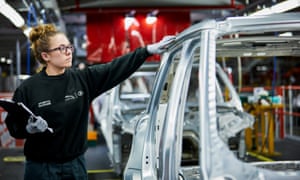Ralf Speth says he did not discuss possible tie-up with head of France’s PSA Group

Jaguar Land Rover could use a partnership with a bigger company to fund electrifying its vehicle range.
Photograph: Handout/Getty Images
Jaguar Land Rover’s chief executive has denied the carmaker is in talks with Peugeot over a possible sale.
The British company’s Indian owner, Tata Motors, was last week forced to deny reports of advanced talks with France’s PSA Group, which owns Peugeot, Citroën and Vauxhall. The Press Association reported a “post-sale integration document” was passed around senior executives at the companies, detailing the potential benefits of a tie-up.
Speaking on Wednesday, JLR’s chief executive, Ralf Speth, said he had met Carlos Tavares, his PSA counterpart, at the latest gathering of the European car industry lobby group but they did not discuss any deal.
“I didn’t have any discussion about it with him at all,” Speth said at the FT future of the car summit in London.
However, he declined to comment on whether Tata Motors had engaged in talks.
While JLR is the largest British manufacturer, with about 18,500 employees making cars in the UK, it is relatively small when compared to companies with global reach such as PSA and Volkswagen. This has led some analysts to suggest a partnership with a larger manufacturer could give the carmaker the scale needed to invest in fully electrifying its vehicles.
“I think we are very well prepared [for electrification] as a British company in Britain,” Speth said.
JLR has already shown itself willing to forge partnerships rather than develop technology alone. Last year it agreed a deal with Waymo, the autonomous driving technology company that is a stablemate of Google at Alphabet, to provide vehicles and collaborate on technology.
The reports of a possible sale come as JLR has underperformed against rivals, particularly in China, where sales fell by more than 45% year on year in April. The company has also been affected by global trade uncertainty, Brexit and a slump in demand for diesel vehicles following air pollution scandals.
In February, JLR was forced to write down the value of its investments by £3.1bn and later that month Speth announced the carmaker would cut about 4,500 jobs, the majority of them in the UK.
Speth said the company had taken “tough decisions” on job cuts ahead of rivals and the company was “on track” to make £2.5bn in cost and efficiency savings over the next three years.
The chief executive also said he was unable to say whether Brexit would hold back the company’s plans, until the shape of the UK’s future economic relationships became clearer, but added that the EU gives an “economic advantage” to members.
He also spoke in emotive terms about the EU’s role in promoting peace, referencing the “thousands of crosses” in second world war graves.